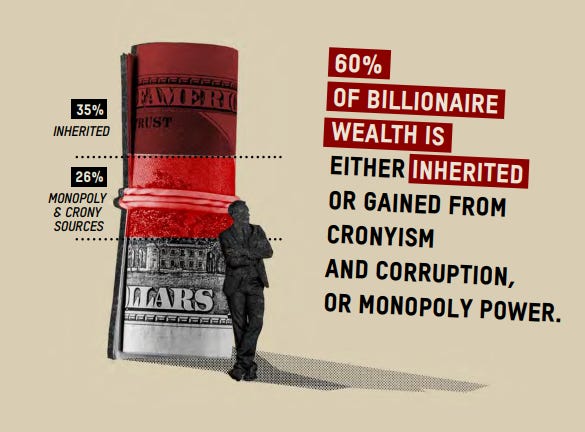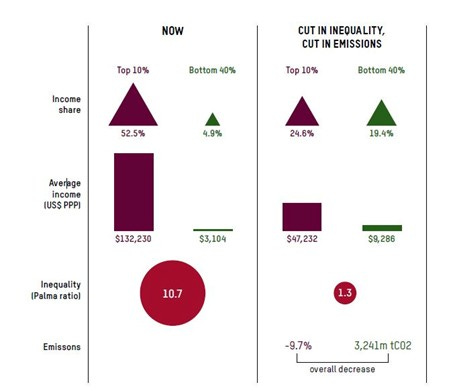How much money did you make while you slept last night? Maybe a few pennies of interest from your bank account? 500 European billionaires, on the other hand, made over half a billion dollars, enough for each one to buy probably every house on your street, just while they slept…in one night.
The idea of a poverty line is pretty well understood. No one should have so little that they can’t afford a roof over their head or go to bed hungry at night. But billions of people around the world can’t afford these basics, despite the wealth increase of billionaires over the last decade being enough to end poverty 22 times over.
Inspired by the work of the fantastic Ingrid Robeyns, this week’s guest on our Equals Podcast, we’re looking at some of the arguments she makes for setting an upper limit to extreme wealth.
The case against extreme wealth…in numbers
They don’t deserve it in the first place. Billionaires like to portray themselves as the pulling themselves up by the bootstraps sort. Work hard and you too could have your very own rocket ship. According to Oxfam’s research, 60% of billionaire wealth is unearned, either from inheritance, cronyism or monopoly sources. In 2023, more billionaires were created through inheritance than through entrepreneurialism. What’s more, the fortunes of many modern-day family dynasties were built on colonialism, slavery and even through close collaboration with the Nazi party (listen to our episode with David de Jong on this). Today, a rigged financial system means the richest 1% in Global North extracts $30 million an hour from the Global South.
Inequality isn’t just wrong, it’s bad for society. How does stronger social cohesion, healthier and happier people, and less child poverty and deprivation sound? As Max Lawson writes, equality truly is a magic bullet. Not just that, but reducing inequality by just 2% every year would triple the speed of poverty reduction. A global wealth tax on the super-rich of up to 5% could raise almost $2 trillion, enough to lift 2 billion people out of poverty, and fund a global plan to end hunger. It is an immensely popular policy, supported by 90% of the global public and even by the super-rich themselves. 74% of millionaires support higher taxes on wealth.
Subscribe to Equals to get next week’s episode and hear from Patriotic Millionaire Joao Paulo Pacifico about why he supports the policy.
The rich are destroying the environment. Last year, we tracked the private jets, super yachts and investments of 50 of the world’s richest people and found that they emit more on average in 90 minutes than the average person does in a lifetime. Cutting inequality could massively reduce global emissions while also ending poverty. If global income was redistributed to ensure that everyone earned above $25 a day, then global emissions would be reduced by 10% (equivalent to the European Union’s total emissions).
You can find all our publications on the topic at our Climate Inequality hub.
Sound a bit red under the bed? As Ingrid points out in the interview, the argument she is making is a moral rather than political one. It’s about ensuring the needs of people and planet are met so everyone can flourish. You don’t have to be a communist to agree with a wealth cap, nor does it necessarily mean rejecting a market-based economy.
OK, I’m sold, but how much is too much? Ah, the million-dollar question (ba dum tsh). Ingrid suggests it could be set at around ten million euros. Research by NEF and Patriotic Millionaires found that one-third of millionaires thought the wealth line should be set at $10 million, while politicians and policy experts preferred a relative measure, for instance, a ratio between individual wealth and the size of the national economy.
It’s fair to say that more work is needed to determine the level, but interest is gathering pace. At the World Bank annual meetings next week, the Patriotic Millionaires have organised an event ‘Extreme Wealth – How Much is Too Much? A New Measure for Better Economies, Democracies, and Societies, with some great speakers, including Abigail Disney, grandniece of Walt Disney. If you are at the Annual Meetings go along, and if you are not, then watch the livestream here.
Something to read and watch
Read Oxfam’s new report on Europe’s inequality crisis and an agenda to tax the super-rich.
Watch this masterclass in speechwriting at the UK’s Green Party conference, and an inspiring and hopeful campaign video.
Read Grace Blakeley’s blog on why workers are scared for the future, with a killer graph showing how, since the start of 2024, consumer confidence of all those who earn under £50,000 per year has been in decline while those above is trending up.
Read Oscar Barrera-Rodriguez on billionaire wealth and tax erosion.
Read (paywall) about progress in Brazil to tax the rich.
Read Branko Milanovic on how to control AI-induced income inequality




